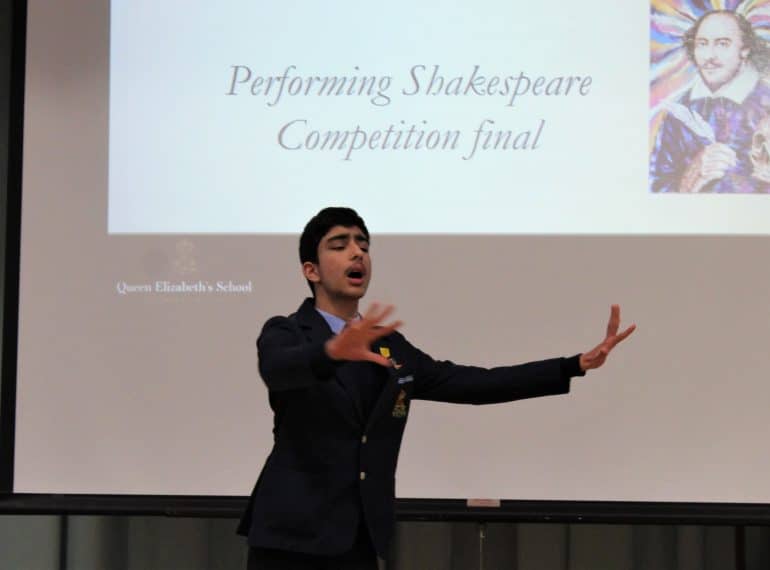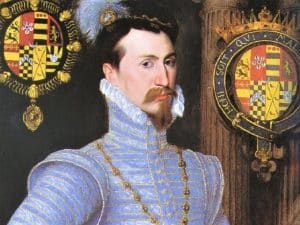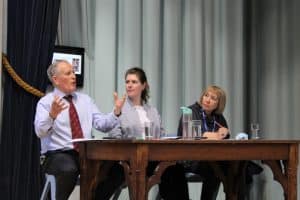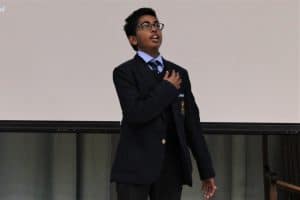Putting the drama back into Shakespeare, tapping into QE’s Tudor legacy

With their impressive and impassioned delivery of Shakespeare’s best-known speeches, finalists in a Year 8 competition gave their classmates a powerful reminder that the bard’s plays were written for the stage, not the classroom.
Twelve young dramatists declaimed some of the most famous passages in the English language in front of their whole year group in the inter-House Performing Shakespeare competition – part of the inaugural QE Shakespeare Festival Week.
Congratulating all the finalists, Headmaster Neil Enright said it was perhaps particularly fitting that the overall individual winner, Soham Sapra, is a member of Leicester House, since that is named after the Earl of Leicester, Robert Dudley.
 “It was Leicester, one of the great figures of the Elizabethan age, a leading patron of the theatre and, of course, a near-contemporary of Shakespeare, who, in 1573, asked Queen Elizabeth I for the Charter to establish Queen Elizabeth’s School,” said Mr Enright. “Thus, our Shakespeare Festival Week in a sense honours his legacy to the arts as we prepare to celebrate the 450th anniversary of our School next year. We are seeking to build on that legacy today through promoting drama and through the central importance we attach to oracy and verbal communication.”
“It was Leicester, one of the great figures of the Elizabethan age, a leading patron of the theatre and, of course, a near-contemporary of Shakespeare, who, in 1573, asked Queen Elizabeth I for the Charter to establish Queen Elizabeth’s School,” said Mr Enright. “Thus, our Shakespeare Festival Week in a sense honours his legacy to the arts as we prepare to celebrate the 450th anniversary of our School next year. We are seeking to build on that legacy today through promoting drama and through the central importance we attach to oracy and verbal communication.”
The troupe of actors known as Leicester’s Men was the first travelling troupe to receive a royal licence under Elizabeth I. Its members included Will Kemp, who was later associated with Shakespeare, and James Burbage, who built The Theatre in Shoreditch, London’s first purpose-built theatre, which gave Leicester’s Men a permanent performance base. The design of the Theatre was very much like the original Globe Theatre, built in 1599 by Shakespeare’s playing company, the Lord Chamberlain’s Men.
The Performing Shakespeare competition began in the second half of the Autumn Term, when all boys in Year 8 were asked to select a Shakespeare speech to learn by heart and perform. This accompanied their curriculum studies of Othello.
 For the final, the English department drafted in their own panel of ‘guest’ judges – History and Politics teacher Liam Hargadon, Head of Geography Emily Parry and Mrs Elaine White, retired teacher of drama at QE. The event was hosted by Assistant Head (Pupil Involvement) Crispin Bonham-Carter.
For the final, the English department drafted in their own panel of ‘guest’ judges – History and Politics teacher Liam Hargadon, Head of Geography Emily Parry and Mrs Elaine White, retired teacher of drama at QE. The event was hosted by Assistant Head (Pupil Involvement) Crispin Bonham-Carter.
The audience and judges heard some of Shakespeare’s most famous speeches, including Hamlet’s “To be or not to be?”, Macbeth’s “Is this a dagger?”, and Henry V’s “Once more unto the breach, dear friends”.
The performers were judged not only on their physical performance and their vocalisation, but on how far their performance suited the speech, and on the extent to which their interpretation of the speech met their artistic intention.
Individual winner Soham chose the famous “All the world’s a stage” soliloquy spoken by the melancholy fool Jaques in As You Like It.
Head of English Robert Hyland said: “Soham gave an impressively accomplished performance, using different physical and vocal mannerisms to present each character in their speech with their own personality, and finished his speech by slowing down the pace of delivery and keeping his audience hooked.
 “The overall House winner was Stapylton; Snehal Das gave a powerful empathetic performance as Shylock from The Merchant of Venice, and Nimesh Nirojan seemed like he was speaking to thousands in the Roman forum as he gave Antony’s funeral oration from Julius Caesar.”
“The overall House winner was Stapylton; Snehal Das gave a powerful empathetic performance as Shylock from The Merchant of Venice, and Nimesh Nirojan seemed like he was speaking to thousands in the Roman forum as he gave Antony’s funeral oration from Julius Caesar.”
The ability to perform Shakespeare’s speeches is integral to pupils’ understanding of the playwright, said Mr Hyland. “They are reminded that Shakespeare’s plays were never meant to be studied in class, but performed in theatres. Learning and performing a speech requires students to make judgements about what a character is saying, and how this will affect things like their movement, their vocal tone, and their interaction with the audience, in a way which analysis in an essay can never do.”
